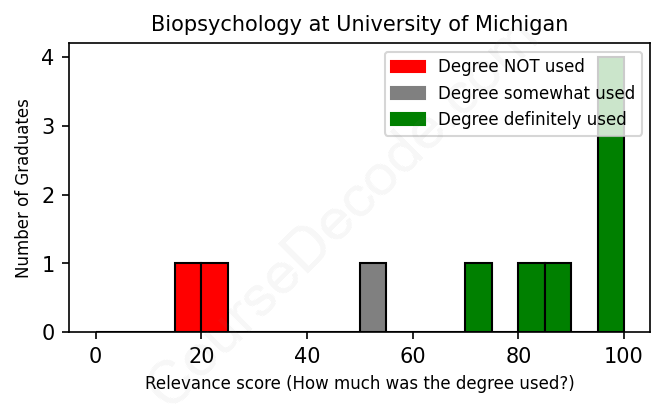
First, some facts. Of the Biopsychology graduates from University of Michigan we've analyzed , here's how many have used (or NOT used) their degree in their career:

These are estimates based on AI analysis of 10 LinkedIn profiles (see below).
The verdict? Above average. Overall, with an average relevance score of 73%, Biopsychology graduates from University of Michigan have a higher likelihood (+6%) of finding work in this field compared to the average graduate across all fields:
And for comparison, here's the chart for all profiles we've looked at across all degrees.
Also, after graduating, 40% of these graduates have pursued further education other than another Bachelor's degree (such as a Masters degree or other), compared to the average across all profiles of 35%. This suggests you may need more than just a Bachelors degree to be competitive as a Biopsychology graduate.
See the details:
|
Relevance score: 73% We think this person has gone into a career highly relevant to their degree. We think this person has gone into a career highly relevant to their degree.
DEGREE INFOGraduated in 2015 from University of Michigan with a Bachelor of Science (BS) in Biopsychology, Cognition, and Neuroscience in Biopsychology. Also pursued further education since (see below). JOB HISTORY SINCE GRADUATIONDay-to-day Substitute Southgate Community School District Feb 2015 - May 2015 Personal Care Attendant  Community Residence Corp. Jan 2015 - Oct 2015 Program Assistant  Beacon Day Treatment Jan 2015 - Oct 2019 Clinical Psychology Intern  The Guidance Center Aug 2019 - Jul 2020 Behavior Technician  Mercy Plus Autism Services Nov 2019 - Aug 2020 Clinical Therapist  Start My Wellness Aug 2020 - Present FURTHER DEGREES DONE SINCE GRADUATINGMaster's degreeMichigan School of Psychology 2018 - 2020 ABOUTNo information provided. |
The top 10 most common jobs done by the graduates we've analyzed (ranked most common to least) are:
After checking out the various jobs that University of Michigan grads with a Biopsychology degree have snagged, it looks like a lot of them have ventured into professions related to the legal field, healthcare, and psychology. Many have taken on roles such as law clerks, clinical therapists, behavior technicians, and registered nurses. What's interesting is that while some positions, like those in healthcare and therapy, align pretty closely with the principles of biopsychology, other roles, especially in real estate and certain administrative positions, stray far from that realm. Positions like being a law clerk or a clinical therapist often allow individuals to use the skills they honed during their degree, such as understanding human behavior and applying psychological principles. On the flip side, jobs in real estate don’t really connect to biopsychology at all; they’re more about negotiation and sales than about any psychological insight.
Overall, it seems like the most relevant jobs for those with a Biopsychology background tend to be in direct patient care, therapy, and research, where their knowledge about human behavior and mental processes can be really valuable. However, there’s a sizable chunk of grads who have landed in roles that don’t make much use of their specialized education, focusing instead on skills that might not directly tie to biopsychology. This mix indicates that while having a degree in Biopsychology lays a solid foundation for certain careers, it isn't always a direct pathway to those fields, and many grads find themselves taking various routes that may only utilize bits and pieces of what they learned in school.
Here is a visual representation of the most common words in job titles for Biopsychology graduates (this is across all Biopsychology graduates we've analyzed, not just those who went to University of Michigan):

Looking at the career trajectories of Biopsychology graduates from the University of Michigan, it’s clear they venture into a variety of fields after graduation. Many seem to kick off their careers in roles that might not directly correspond with Biopsychology right away, like internships, teaching positions, or even roles in real estate. But as time goes on, more graduates find their way into health-related fields—like therapy, nursing, or clinical roles—which are quite close to Biopsychology themes. Positions such as Clinical Therapist or Clinical Pharmacist show that some alumni have indeed carved out paths that make sense with the knowledge and skills they gained during their studies.
However, there also seems to be a decent number who have taken routes that stray a bit further from their degree focus. For instance, positions in project management or real estate are not directly related to Biopsychology, indicating that not every grad will immediately utilize their specialized education in their first post-college job. Five to ten years down the line, though, many appear to either have redirected their careers back towards health or psychology-related professions or shifted into management roles that could potentially benefit from their analytical skills developed during their Biopsychology degree. Overall, while some graduates find rewarding positions related to their degree, others may need to explore various fields before landing a role that aligns more closely with their background.
Honestly, getting a Bachelor’s degree in Biopsychology can be pretty challenging, especially at a tough school like the University of Michigan. It's a blend of biology, psychology, and neuroscience, so you’ll be dealing with everything from brain chemistry to behavior patterns, which can be a lot to juggle. The coursework usually involves a fair amount of science classes, labs, and research, so if you’re not super into science or math, it might feel a bit overwhelming at times. That said, if you’re passionate about understanding how the mind and body connect, it can be incredibly rewarding. Overall, expect a solid mix of hard work, interesting material, and some late nights studying!
Most commonly, in the LinkedIn profiles we've looked at, it takes people 4 years to finish a Bachelor degree in Biopsychology.
Looking at these Biopsychology grads from the University of Michigan, it seems like their earnings really vary depending on the paths they've taken. For instance, the graduates who went into law, real estate, and pharmacy typically seem to be on better money trajectories compared to those who’ve stuck to more entry-level or educational roles, like substitute teaching or behavioral therapy. The law and pharmacy routes, especially, usually come with decent pay, given the nature of those fields. However, those who are still in early-career or part-time roles might not be raking it in just yet. So, while some are likely doing pretty well financially, others might be in the grind for a while before they see the money really roll in.
Here is a visual representation of the most common words seen in the "about" section of LinkedIn profiles who have a Bachelor degree in Biopsychology (this is across all Biopsychology graduates we've analyzed, not just those who went to University of Michigan). This may or may not be useful:

Here are all colleges offering a Bachelor degree in Biopsychology (ordered by the average relevance score of their Biopsychology graduates, best to worst) where we have analyzed at least 10 of their graduates:
| College | Score | Count |
|---|---|---|
 University of Michigan University of Michigan
|
73 | 10 |
 Tufts University Tufts University
|
67 | 11 |
 UC Santa Barbara UC Santa Barbara
|
64 | 10 |
 University of California, Santa Barbara University of California, Santa Barbara
|
61 | 15 |